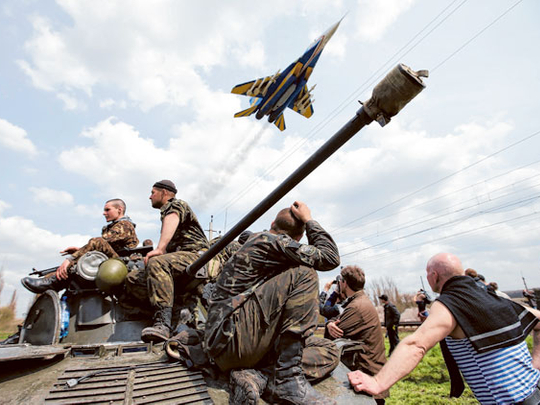
Slavyansk, Ukraine: Ukrainian and pro-Russian forces flexed their military muscles in the restive east of the country on Wednesday, a day ahead of high-level diplomatic talks on the escalating crisis.
Armoured vehicles from the rival sides appeared on the streets of two neighbouring towns after Russian President Vladimir Putin warned that Kiev’s decision to send in troops to put down a separatist uprising in its industrial heartland had dragged the country to the brink of civil war.
Nato said it planned to deploy more forces in eastern Ukraine in the face of the crisis, while Germany warned of more bloodshed if the four-way talks in Geneva on Thursday fail.
In the flashpoint town of Slavyansk at least six APCs and light tanks, some flying Russian flags, parked in the city centre with dozens of unidentified armed men in camouflage stationed around them.
Russian media said Ukrainian troops in the vehicles had switched sides to join the separatists but the Ukrainian army said that it had no reports that any of its equipment had been seized.
In the nearby town of Kramatorsk, Ukrainian forces had deployed a column of 14 armoured vehicles, although these were being blocked by a crowd of pro-Russian protesters.
Military jets could be seen flying low over both towns in an additional show of strength.
As the situation on the ground appeared to escalate, the authorities in Kiev ratcheted up the verbal attack on Russia, with Prime Minister Arseniy Yatsenyuk accusing Moscow of trying to build “a new Berlin wall”.
Firm response
Yatsenyuk demanded Moscow halt its alleged support for the separatists but said Kiev remained committed to Thursday’s crunch talks between the top diplomats of Russia, the European Union, the United States and Ukraine.
“There is only one directive for the Ukrainian foreign ministry — the Russian government has to immediately withdraw its commando groups, condemn the terrorists and demand they leave the installations,” he said.
Ukraine’s acting Defence Minister Mykhailo Koval on Wednesday headed out to the east to check on the progress of Kiev’s seemingly stalled bid to oust the separatists.
Ukraine’s military also pledged a firm response after two serviceman were allegedly taken hostage by pro-Russian forces in the Lugansk region.
The Ukrainian Security Service (SBU) said in a statement that Russian commanders in the east had issued pro-Kremlin militants with “shoot-to-kill” orders.
Elsewhere, pro-Moscow gunmen stormed the mayor’s office in the regional capital of Donetsk.
On Tuesday, authorities in Kiev launched what they called an “anti-terrorist operation”, sending tanks towards Slavyansk — which remains effectively under the control of pro-Russian gunmen — in a high-risk strategy sharply condemned by the Kremlin but supported in Washington.
The 20 tanks and armoured personnel carriers sent to Slavyansk were the most forceful response yet by the Western-backed government in Kiev to the pro-Kremlin militants’ occupation of state buildings in nearly 10 cities across Ukraine’s rust belt.
But the move drew a sharp response from Putin in a telephone conversation with German Chancellor Angela Merkel.
Geneva talks
“The Russian president remarked that the sharp escalation of the conflict has placed the country, in effect, on the verge of civil war,” the Kremlin said in a statement.
But both Putin and Merkel “emphasised the importance” of Thursday’s Geneva talks.
The Kremlin described the actions of the Ukrainian army in the east as an “anti-constitutional course to use force against peaceful protest actions”.
Kiev’s response to the insurgency also prompted Putin to tell UN Secretary General Ban Ki-moon that Moscow “expects clear condemnation from the United Nations and the international community of the anti-constitutional actions” by Ukraine.
Ban in turn “expressed his alarm about the highly volatile situation in eastern Ukraine” and told the Russian leader that everyone involved needed to “work to de-escalate the situation”, his office said.
But the White House described Ukraine’s military operation as a “measured” response to a lawless insurgency that had put the government in an “untenable” situation.
Washington also said it was coordinating with its European allies to slap more sanctions on Russia over the crisis.
“Our national security team is in active discussions about the next round of sanctions,” State Department spokeswoman Jen Psaki told reporters.
She added however that new measures were unlikely before the Geneva talks.
Breakaway move
Kiev’s untested interim leaders — who took power in February after four months of pro-European protests ousted Kremlin-backed president Viktor Yanukovych — have struggled to meet the high-stakes challenge presented by the coordinated series of raids that began in the industrial hubs of Donetsk and Lugansk and have since spread to nearby coal mining towns and villages.
The breakaway move could potentially see the vast nation of 46 million people break up along its historic Russian-Ukrainian cultural divide.
Moscow last month annexed the largely Russified region of Crimea after deploying military forces there and backing a hasty local referendum calling for the Black Sea peninsula to be absorbed into the Russian Federation.
But a forceful military response by Kiev could prompt a devastating counterstrike by Russian troops who are waiting to act on Putin’s vow to “protect” Russian-speakers in the neighbouring state.
Ukraine’s acting President Oleksandr Turchynov told an agitated session of parliament on Tuesday that the country was facing an eastern enemy rather than domestic discontent.
“They want to set fire not only to the Donetsk region but to the entire south and east — from Kharkiv to the Odessa region,” he said.












